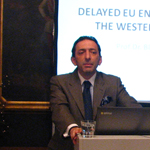Euroacademia Conferences
 Europe Inside-Out: Europe and Europeanness Exposed to Plural Observers (9th Edition) April 24 - 25, 2020
Europe Inside-Out: Europe and Europeanness Exposed to Plural Observers (9th Edition) April 24 - 25, 2020 Identities and Identifications: Politicized Uses of Collective Identities (9th Edition) June 12 - 13, 2020
Identities and Identifications: Politicized Uses of Collective Identities (9th Edition) June 12 - 13, 2020 8th Forum of Critical Studies: Asking Big Questions Again January 24 - 25, 2020
8th Forum of Critical Studies: Asking Big Questions Again January 24 - 25, 2020 Re-Inventing Eastern Europe (7th Edition) December 13 - 14, 2019
Re-Inventing Eastern Europe (7th Edition) December 13 - 14, 2019 The European Union and the Politicization of Europe (8th Edition) October 25 - 26, 2019
The European Union and the Politicization of Europe (8th Edition) October 25 - 26, 2019 Identities and Identifications: Politicized Uses of Collective Identities (8th Edition) June 28 - 29, 2019
Identities and Identifications: Politicized Uses of Collective Identities (8th Edition) June 28 - 29, 2019 The European Union and the Politicization of Europe (7th Edition) January 25 - 26, 2019
The European Union and the Politicization of Europe (7th Edition) January 25 - 26, 2019 7th Forum of Critical Studies: Asking Big Questions Again November 23 - 24, 2018
7th Forum of Critical Studies: Asking Big Questions Again November 23 - 24, 2018 Europe Inside-Out: Europe and Europeanness Exposed to Plural Observers (8th Edition) September 28 - 30, 2018
Europe Inside-Out: Europe and Europeanness Exposed to Plural Observers (8th Edition) September 28 - 30, 2018 Identities and Identifications: Politicized Uses of Collective Identities (7th Edition) June 14 - 15, 2018
Identities and Identifications: Politicized Uses of Collective Identities (7th Edition) June 14 - 15, 2018
Delayed EU Enlargement in the Western Balkans
-
-

-
Presentation speakers
- Blerim Reka , South East European University, Pro - Rector for Research, Professor of International Law and EU Law, Tetovo, Republic of Macedonia
- Download presentation
Abstract:
After one century of delay in the European reformation of the Balkans: 1914-2011; and a decade of status quo of enlargement: 2000-2010; Western Balkans is facing a new historic challenge: will the next decade: 2010-2020 be another decade of unrealistic expectations to be part of the EU? The key dilemma in the relation between EU and Western Balkans remains the same: will the EU Europeanize the Balkans, instead of being Balkanized itself? In this paper, I will try to analyze the crucial factors of this existing situation and offer a prospect for a new way of accession of the countries from Western Balkans to the EU. I will try to indicate two parts of the problem. The first is within EU: the existing enlargement policy, which I suspect was something between accession and soft protectorate. The second problem is within the countries of the region, mainly their political mentality. I advance the need for re-branding the Western Balkans, which means: the people, especially the political elites from this region, should change their mentality and should release from one century of suspicion that regional integration could lead towards pan-nationalist ideas. The geography is there and we cannot change it, although the history tried to do so. As a consequence of that history, politically, the new state was created; but demographically, the same national substance remained in place. Western Balkans are tired from permanent struggles between geography and history. The only way to prevent further clash between them and to have them together, is the integration of the region into the EU. The European Union should take a more flexible approach towards its enlargement in Western Balkans, in order to prevent the balkanization of Europe. Instead: to Europeanize of the Balkans, Brussels in the next decade, (2010-2020), should change its approach from the first decade (2000-2010). The first decade of the stabilization of the Western Balkans is over. Now, EU should more robustly move: from stabilization toward association of the whole region in EU. -
Related Presentations

Legislative Transparency and Censorship in the Council of Ministers of the European Union
- James Cross

















